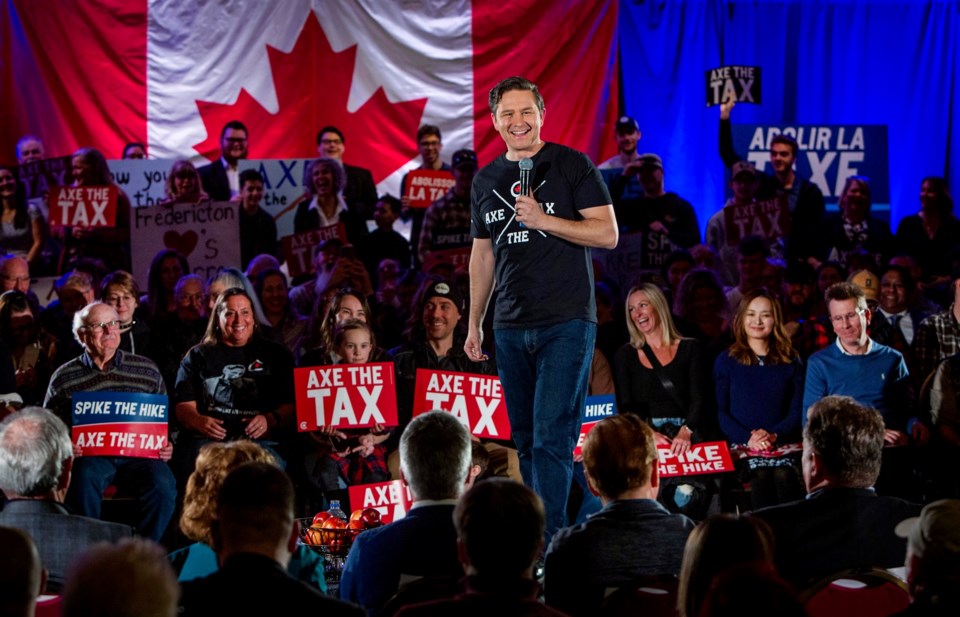It’s a clash of political titans over the carbon tax — Canada’s most popular party leader and the man likely to become the country’s next prime minister, versus British Columbia’s most popular politician and the leading candidate to win this October’s provincial election.
Conservative Leader Pierre Poilievre started the war of words Friday, with an open letter to Premier David Eby urging him to use the province’s discretion and refuse to administer a scheduled increase to the carbon tax of 23 per cent on April 1.
“Do not administer the April 1st tax hike,” he wrote. “Join the seven other premiers demanding [Prime Minister Justin] Trudeau stop the hike.”
Eby mocked the idea in response.
“I don't live in the Pierre Poilievre campaign office and baloney factory,” he said. “I live in B.C., am the premier, and decisions have consequences.”
There’s a lot going on behind the scenes that have led these two leaders to dig into their positions.
Eby is a convenient villain for Poilievre to grow.
He’s arguably the most prominent NDP premier in the country (outside of Manitoba’s Wab Kinew) and there’s an easy link to be drawn between Eby’s B.C. NDP and the federal NDP, where leader Jagmeet Singh is propping up the Liberal minority government and looks to be facing annihilation in the next election.
We see that language reflected in new Conservative attack ads launched against Eby on Sunday.
“It’s no joke, on April Fools’ Day, along with Trudeau and Singh, David Eby and the NDP are hiking carbon taxes again,” the ad says. “Gas, heat, groceries, all up.”
Poilievre is in the middle of a national ‘axe the tax’ tour, where he’s drawing thousands to rallies promising to end the carbon tax. Seven (mostly centre-right) premiers have already endorsed his call to scrap the April 1 hike. Eby increasingly stands alone as the last line of defence. It makes him a natural target.
“My message to the NDP premier and to Justin Trudeau and Jagmeet Singh is get your hands out of the pockets of British Columbians,” Poilievre told me in a weekend interview.
“Let them afford food, gas and heat once again.
“It takes 29 years in Vancouver to save up for a down payment, food-bank use is at record highs, we have tent cities right across Vancouver Island because people can't afford to pay their rent — and Justin Trudeau and the NDP think now is the time to hike people's taxes by 23 per cent. It's insane.”
B.C. originated the carbon tax in 2008.
Eby has steadily defended it during the ongoing affordability crisis, against calls from the Opposition BC United to halt the increase and the BC Conservatives to cancel the tax entirely. It would be difficult for the premier to pivot from such a definitive position now.
It does not help the NDP’s fortunes that its defence of the carbon tax is so weak. Eby is parroting Trudeau talking points that any reduction in the tax rate would also mean a reduction in the rebate cheques being sent to taxpayers.
“I know that Mr. Poilievre knows that his suggestion would mean less money for British Columbians,” said Eby.
“That’s not his priority, fair enough. This is not the only suggestion from Mr. Poilievre that I think would struggle with contact with reality.”
But B.C.’s argument that it’s spending more on rebates than it is collecting from the carbon tax also struggles upon contact with reality.
True, the government will spend $867 million in climate action tax credits by 2025, compared to $649 million in revenue. But the numbers are meaningless for many.
Only low-income British Columbians see any carbon tax rebates.
A single person with no kids has to earn less than $39,115 annually (net after taxes) to get the full $447 a year. It’s a sliding scale down from there. A single person who earns more than $61,465 gets absolutely nothing.
That leaves much of the vast urban middle-class voters of Metro Vancouver out in the cold. When they start worrying about the carbon tax adding three cents a litre to the price of gas on April 1, New Democrats will have nothing to offer them other than useless talking points about a rebate they aren’t eligible to get.
The BC NDP will have to do something more if it intends to be the lone defender of the carbon tax in the country, in the middle of a provincial election year, against a surging federal Conservative party, during an ongoing affordability crisis.
Until then, Eby is an easy mark for Poilievre. And the federal leader will keep on pushing until the damage with voters is done.
Rob Shaw has spent more than 16 years covering B.C. politics, now reporting for CHEK News and writing for Glacier Media. He is the co-author of the national bestselling book A Matter of Confidence, host of the weekly podcast Political Capital, and a regular guest on CBC Radio.





